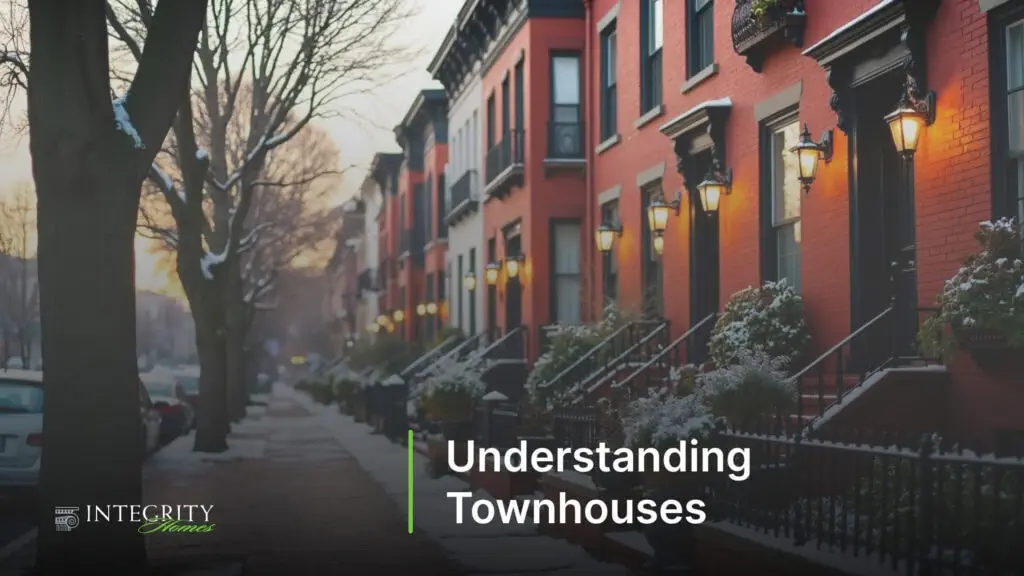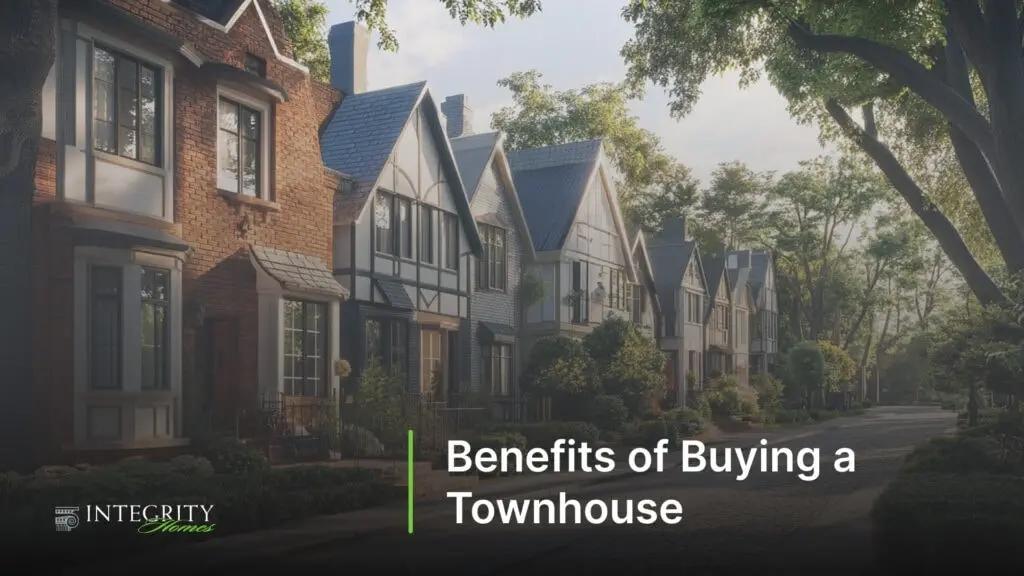
Pondering the intelligence of investing in a townhouse? These dwellings are not only economical but also boast minimal upkeep requirements. They do carry certain aspects that warrant careful consideration. We will delve into both advantages and disadvantages within this article to assist you in determining whether purchasing a townhouse is a wise decision.

Multistory townhouses share side walls with adjacent units and are typically designed with living spaces on the lower level and bedrooms above. These vertically oriented homes stand in contrast to single-family detached houses, offering a variety of architectural styles within their communities, despite their shared layout.
To condos, where property maintenance is predominantly managed by the homeowners association (HOA) and includes both interior and exterior maintenance, townhouse owners. Have more authority over external aspects of their home. This situates townhouse living as a hybrid experience single family home that merges condo-style communal governance with the independence associated with owning a single-family residence.

Townhomes present a compelling combination of advantages attractive to various purchasers. Typically, they come with a lower price tag compared to single-family homes, offer the perks of a low-maintenance lifestyle, and include shared amenities that cultivate both community bonds and convenience.
Now, let’s explore these benefits more closely.
Affordability is one of the most compelling reasons for buying a townhouse. Compared to single-family homes, townhouses often come with lower price tags, making them an attractive option for first-time homebuyers. Their smaller size and lower construction costs contribute to this affordability, allowing young families and professionals to enter the housing market without stretching their finances thin.
Moreover, townhouses are frequently found in convenient areas, providing easy access to urban amenities without the hefty price tag associated with a detached house. This makes them a practical choice for those looking to balance affordability with location.
Townhouse living offers the advantage of a lifestyle that demands minimal upkeep. Homeowners associations (HOAs) within numerous townhouse communities manage crucial services like landscaping, maintenance, snow removal, and trash removal. This substantial reduction in exterior maintenance responsibilities enables owners of townhouses to devote more time to delighting in their homes instead of being preoccupied with ongoing care.
The appeal of this low-maintenance way of life is especially strong among young families and working professionals. Although the monthly HOA fees represent an extra expense, they are considered a worthwhile investment for the ease and tranquility that come from having external upkeep handled by others.
Often, many townhouse communities provide a variety of communal amenities that improve the quality of life for their residents. These shared facilities range from swimming pools and fitness centers to community gardens, akin to what one might find in an apartment complex setting. The provision of such amenities fosters social interaction and helps build a robust sense of community and belonging among neighbors.
For those who own townhouses, the expense associated with upkeep of these communal luxuries is usually less burdensome than it would be for individual, detached homes and houses owners. This aspect renders living in a townhouse both practical and financially advantageous.

Townhouses come with several advantages, yet they also present certain limitations. Concerns related to privacy can arise due to common walls shared between units. Homeowners may face restrictions on their autonomy because of HOA fees and regulations, as well as confined outdoor spaces that might not suffice for all residents’ requirements.
To delve deeper into these disadvantages:
Residents of townhouses often worry about privacy due to the shared walls that adjoin neighboring units, potentially elevating noise and disrupting tranquility—a critical issue for individuals who prioritize a quiet environment. Townhouses, in contrast to detached houses, provide reduced levels of privacy which may dissuade certain purchasers.
Living in such close quarters with neighbors might encroach on one’s personal and private outdoor space. Despite the benefits associated with the communal nature inherent in townhouse living, this arrangement can compromise private space more than what is typically experienced in independent homes.
The monthly fees associated with a homeowners association (HOA) can add significantly to the cost of living in a townhouse. When considering buying such property, it is essential for potential townhome owners to thoroughly examine the HOA’s regulations and strict rules so they fully understand the financial obligations and limitations they are committing to.
Homeowner association fees could come along with rigorous stipulations that may infringe on personal liberties regarding changes or how one utilizes their property. There might be specific guidelines dictating what kinds of flowers residents are allowed to grow, or even age requirements for vehicles parked within the community.
Consider the drawback of restricted outdoor space when it comes to townhouses. They typically offer only modest private outdoor sections, like compact yards or patios, which might fall short for individuals looking for ample space to engage in activities such as gardening, swimming pool hosting gatherings, or other pursuits.
The diminutive nature of these private outdoors can be stifling for how one wishes to utilize them. For those accustomed to the more expansive grounds associated with single-family homes in nearby suburbs, adapting to this limitation can pose a considerable challenge.

When purchasing a townhouse, it is crucial to meticulously assess various financial elements that can substantially affect the total budget. This includes property taxes, insurance costs, and closing costs associated with the transaction. Each aspect warrants a detailed examination to ensure proper financial planning.
These expenses often cover charges for appraisal, inspection, and title insurance to name just a few. It is important that buyers set aside funds specifically for these costs as it plays a crucial role when purchasing a home, such as townhouses.
At the time of closing your land acquisition, typical fees also encompass loan origination fees and government recording fees. To ensure there are no unexpected financial hurdles in concluding your property acquisition, being aware of and budgeting for these costs is imperative.
Typically, townhouse and condo owners enjoy reduced insurance premiums when compared to single family homes. The shared nature of the structural design in townhouses mitigates personal risk factors. Plus, many homeowners associations take on some insurance responsibilities, which can Decrease expenses for those owning a townhouse.
These more economical insurance rates often enhance the desirability of purchasing a townhouse, particularly for buyers who prioritize their budget. This financial advantage contributes to the attractive qualities associated with residing in a townhouse.
Owners of townhouses frequently enjoy the advantage of having their property assessed at lower values than those owning detached single-family homes, which can translate into considerable long-term savings. The appeal for cost-aware purchasers is amplified by these reduced assessments, as they typically correspond with diminished taxes and increase the financial appeal of townhouse living.
For numerous potential owners looking to purchase a townhome, the reduction in property taxes often plays a crucial role in their decision-making process. This factor, coupled with additional economic advantages linked to owning a townhouse, makes it an attractive option for many.

Townhouses typically represent a solid investment in the realm of real estate due to their robust value, substantial rental demand, and favorable current market dynamics. Here’s an analysis of why investing in townhouses might be considered a wise financial decision.
Several elements, such as location, market trends, and demand, significantly impact the resale value of townhouses. A townhouse situated in a desirable neighborhood, particularly one close to urban centers, good schools, or transportation hubs, often experiences higher demand, which positively influences its resale value.
In 2022, U.S. buyers ranked townhouses as their second preferred type of home. This choice reflects their widespread appeal and significant position in the market. Consequently, this favorability may lead to an active resale market for townhouses, rendering them a dependable investment option.
In major urban centers such as Washington D.C. and Virginia, there is a notably strong demand for townhouse rentals. For real estate investors seeking to produce rental revenue, this robust demand makes townhouses an attractive investment choice.
The surge in the desire to rent townhouses greatly enhances their attraction for investment purposes. Real estate investors stand to gain from consistent rental earnings and have the added advantage of the possibility of property value appreciation over time.
Acquiring a townhouse presents an appealing mix of affordability, ease of upkeep, and easy access to shared amenities that draw in many purchasers. Despite potential downsides like less privacy, homeowner association fees, and restricted outdoor areas, the economic advantages and opportunities for investment usually tip the scale favorably. A thorough comprehension of what it means to own a townhouse empowers you to make choices that are in harmony with your personal desires as well as your fiscal objectives.
To sum up, committing to a townhouse purchase in 2024 might prove advantageous whether you’re venturing into homeownership for the first time, actively engaged in real estate investing or seeking simpler living quarters. It’s crucial to balance all factors meticulously and assess financial impacts thoroughly so this housing selection complements both how you want to live day-to-day life and long-term monetary plans.
Opting for a townhouse can provide an affordable and low maintenance lifestyle, along with the added benefits of community facilities such as swimming pools and fitness centers.
This smart investment allows for a relaxed and convenient way of life!
Townhouse living can feel a bit cramped because of shared walls, and you might find HOA fees and rules restrictive.
Plus, the outdoor space often isn’t as private as you’d like it to be.
Owning a townhouse entails additional financial obligations due to HOA fees, which contribute to your cumulative costs. These monthly fees are instrumental in facilitating critical services such as lawn care, upkeep and gardening.
It is important to be aware that alongside these charges can come regulations restricting the ways in which you can alter your property.
Certainly, investing in townhouses can prove to be a wise financial decision due to their strong potential for appreciation and substantial rental market demand. This is particularly true with the current inclination towards life in suburban areas.
Choosing to invest in a townhouse could very well be an excellent strategy to ensure your economic prosperity moving forward!
It’s crucial to take into account the expenses related to property taxes, insurance, and closing costs when purchasing a townhouse since they can have a substantial impact on your financial plan.
To prevent unexpected fiscal challenges in the future, be sure to thoroughly assess these costs before your down payment and finalizing your townhouse purchase.
Maryland | Frederick, MD | National Harbor, MD | Potomac, MD
Virginia | Alexandria, VA | Fairfax, VA | Lorton, VA | Northern, VA | Stafford, VA | Stephenson, VA | Winchester, VA | Washington DC